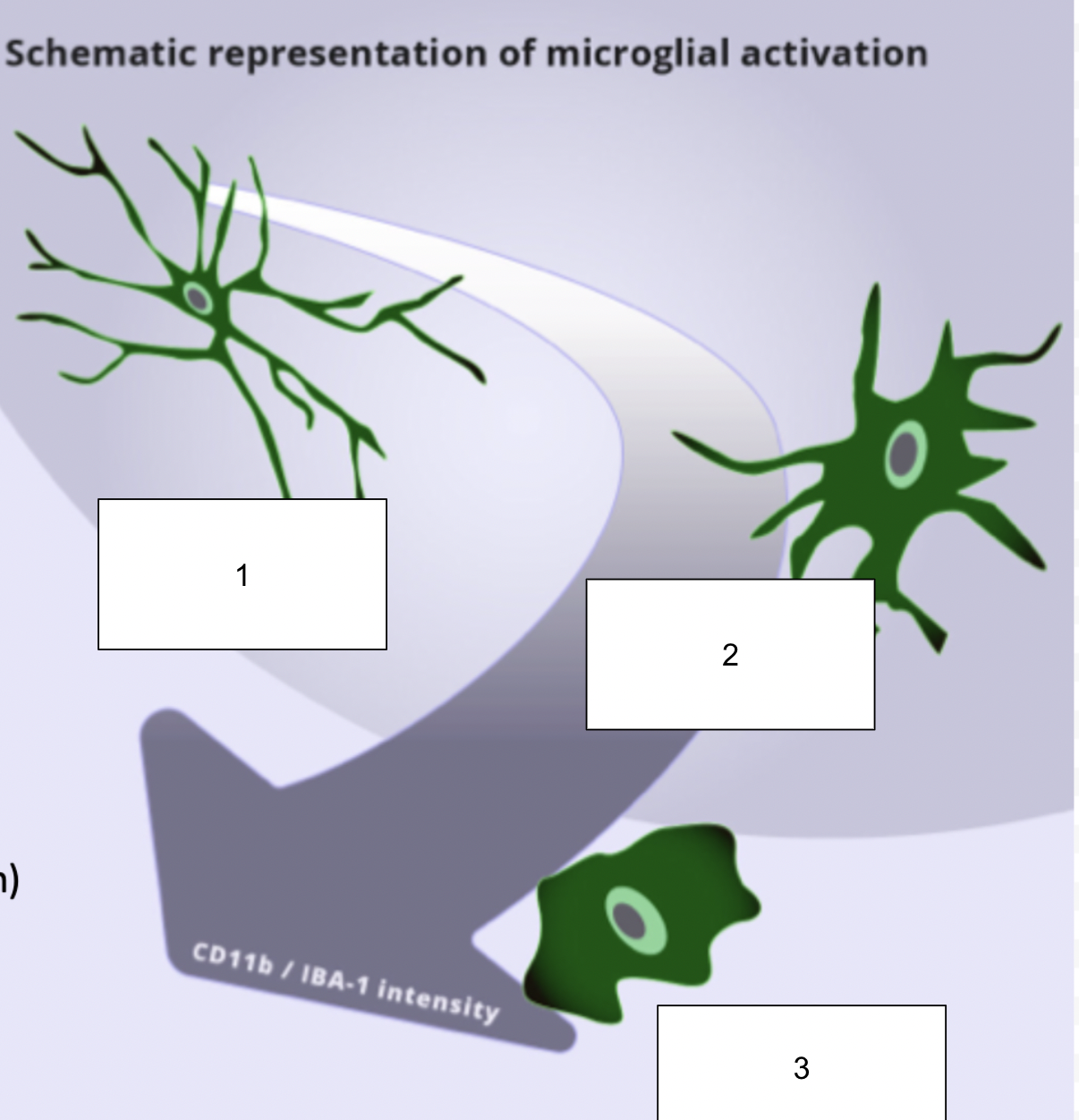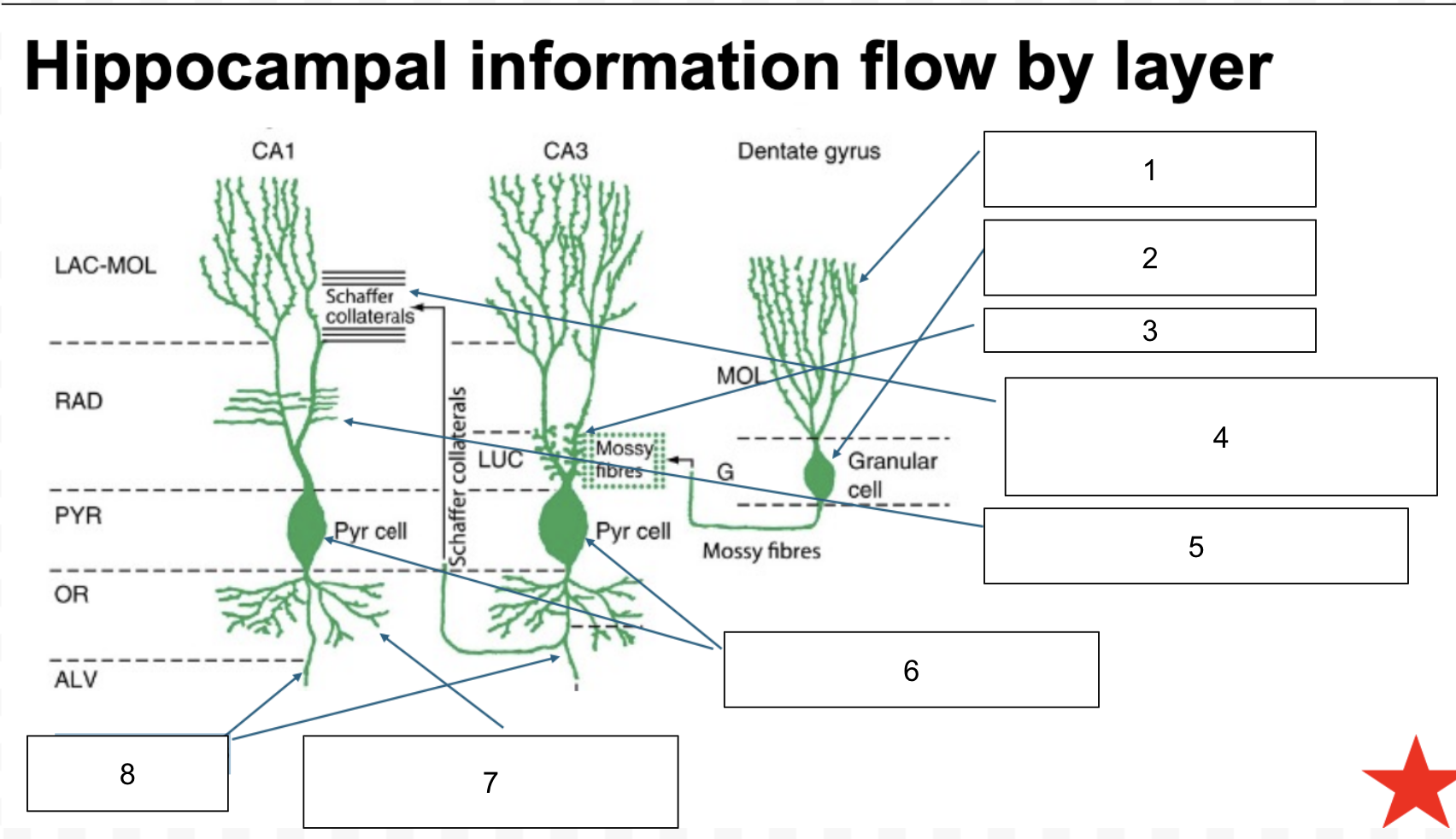Lecture 14 - Hippocampus and Place cells
1/25
There's no tags or description
Looks like no tags are added yet.
Name | Mastery | Learn | Test | Matching | Spaced |
|---|
No study sessions yet.
26 Terms
What are the main anatomical subdivisions of the hippocampus?
The hippocampus includes CA1, CA2, CA3 (cornu ammonis subfields) and the dentate gyrus (DG)
What is the trisynaptic circuit of the hippocampus?
Input arrives from the entorhinal cortex via the perforant path to DG granule cells → mossy fibers to CA3 pyramidal cells → Schaffer collaterals to CA1 pyramidal cells
What is the role of hippocampal layers (e.g., stratum radiatum, pyramidale, oriens, alveus)?
They organize neuronal architecture: dendrites, somas, and axons occupy different layers, helping structure connectivity and information flow
How do neuroscientists determine if neurons “code” for information?
By correlating neuronal spike trains with behavioral variables (location, speed, sensory input) across time
What are place cells and who discovered them?
Place cells are hippocampal pyramidal neurons that fire when an animal is in a specific location. Discovered by John O’Keefe in 1971, who won the 2014 Nobel Prize for this work
How do place cells challenge prior assumptions about neuron activity?
They showed that single neurons can directly represent behavior (location), disproving the idea that neural activity was too distributed to map onto behavior
How do place cells demonstrate context dependence?
Their firing patterns change when an environment’s shape or features change (e.g., circle vs. square arena)
What are splitter cells and what do they represent?
Splitter cells are hippocampal neurons that fire differently depending on an upcoming choice (e.g., left vs. right turn in a T-maze), showing coding of future routes
What are time cells and where were they discovered?
Time cells are hippocampal neurons that fire sequentially during delays, creating “time fields” that tile time across seconds. Discovered in CA1 recordings
How do time cells encode longer timescales?
They can maintain place fields but change firing rates based on context duration, such as morning vs. evening differences (Mankin et al., 2012)
What does Mankin et al. (2012) show about hippocampal coding of time?
Hippocampal neurons adjust firing rates depending on how long since an animal entered a context, not simply the time of day, revealing flexible temporal coding
How do place cells represent “what” in addition to “where”?
They increase firing in task-relevant zones (e.g., goal areas) and can encode objects or conspecifics in the environment
How do hippocampal neurons encode sensory features beyond space and time?
For example, in rats trained to press a lever to alter tone frequency, hippocampal ensembles tiled auditory frequency space, but only during active task engagement
Why is the hippocampus considered a multimodal coding structure?
Its pyramidal cells represent “what,” “where,” and “when,” providing the foundation for episodic memory
How does hippocampal coding relate to imagining the future?
Patients with hippocampal damage cannot form new episodic memories and also struggle to imagine future events, suggesting hippocampal coding underlies both memory and future simulation
What recognition did John O’Keefe receive for discovering place cells?
He won the 2014 Nobel Prize in Physiology or Medicine (shared with May-Britt and Edvard Moser for grid cells)
How do place cells demonstrate flexibility across contexts?
Their firing patterns remap when an environment’s features (e.g., shape or cues) change, showing context-sensitive coding
What are splitter cells and what do they reveal?
Splitter cells fire differently depending on an animal’s intended route (e.g., left vs. right turn), encoding future trajectory as well as present location
What are time cells in the hippocampus?
Neurons that fire sequentially during temporal delays, tiling intervals of time like place cells tile physical space
Where were hippocampal time cells discovered?
In CA1 recordings, during tasks with delays where animals waited for rewards
What key finding did Mankin et al. (2012) contribute about hippocampal time coding?
Hippocampal neurons change firing depending on elapsed time within a context, not just external cues (e.g., morning vs. evening), suggesting internal time coding
How do hippocampal neurons encode auditory information?
When rats pressed levers to alter tone frequencies, hippocampal ensembles represented auditory frequency space, but only when task-relevant
Why is hippocampal coding considered multimodal?
Because it integrates what (content), where (location), and when (time), the three core components of episodic memory
How does hippocampal damage affect memory and imagination?
Patients cannot form new episodic memories and also cannot imagine future events, suggesting the hippocampus supports both recall and simulation

label this diagram
ramified - homeostatic surveillance, monitoring
bushy - neurodegeneration, inflammation, toxicity
amoeboid - phagocytosis, inflammation, motility

Label this diagram:
MOL = Molecular layer- Dendrites of granule cells
G = Granule layer - Granule cell bodies
LUC = Stratum Lucidum
LAC-MOL = Stratum Lacunosum Moleculare - Fibers of the perforant pathway
RAD = Stratum Radiatum - Apical dendrites of pyramidal cells
PYR = Stratum Pyramidale - Cell bodies of pyramidal cells
OR = Stratum Oriens - Interneurons and dendrites of pyramidal cells
ALV = Alveus axons